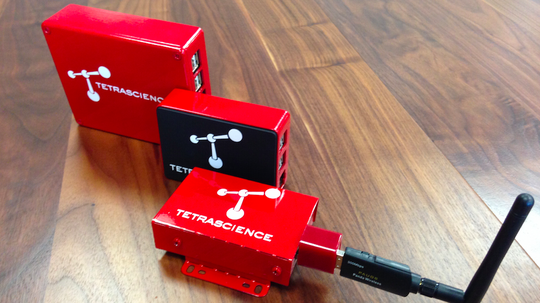
It’s quite a feat for a startup to keep quiet about the launch of its products. It’s even more impressive when these said products have been used in some of the most prestigious hospitals and universities in the world for more than eight months. But somehow, TetraScience has managed to do just that.
Now it’s time for us to shine a spotlight on the TetraScience team. The venture, which operates out of Harvard’s Launch Lab, has big news to share in a couple of months, so we figured we’d set the stage by sharing how this startup came to be. (As well as how its platform could revolutionize how scientists conduct research).
It's like Nest - but for important science purposes
To put it simply, TetraScience is bringing the Internet of Things to scientists. The team - which is linked to Harvard and MIT - has developed hardware and software that allows researchers to connect their instruments to the cloud. The instruments can be anything from humidity sensors to freezers to sterilizers. And with TetraScience’s technology, scientists can then monitor and manage experiments remotely, while collecting the data they need.
Why could this be so revolutionary? Alok Tayi, co-founder and CEO at TetraScience, explained that there are currently inane, outdated and error-prone processes holding back scientists - and science itself. Many researchers spend their precious time watching over experiments, making in-person adjustments and jotting down data by hand.
“On average, for every hour a scientist runs an experiment, there’s another hour spent managing data,” Tayi said.
“Many researchers rely on pen and paper to collect data, which can result in many problems,” he continued. “Things can go wrong without them even knowing it and there can be experimental deviations, as well as a lack of productivity because a lot of time is spent doing stupid things.”
Tayi and his co-founders, Siping Wang and Salvatore Savo, are trying to eliminate inefficiencies in the scientific process with what he describes as a “Nest-like” device focused on laboratory use.
“The goal is to let researchers and lab managers accelerate the process, so they’re far more productive far more quickly,” Tayi explained.
Preventing problems before all is lost
The team has created a device that basically acts as an Apple TV, allowing all kinds of instruments - no matter their maker - to connect to TetraScience’s cloud-based software. With a lab’s scientific instruments and sensors connected to the Web, researchers will have remote access to monitoring, managing and automating experimentation. There are even alerts that can be set to let scientists know if something has gone awry.
Not only will this free up scientists to make more discoveries at a faster pace, but it will also hopefully encourage more people to pursue careers in scientific research.
Tayi told me, “In an academic environment, researchers are required to be in the laboratory at all hours of the night.”
“I also remember that some of my colleagues at Harvard who were studying vaccines had an issue with the freezer door sticking, but none of them realized it,” he continued. “An entire set of samples that were on the door ended up melting and they lost about 3 PhDs’ worth of work. It was no one’s fault, but situations like that detract people from becoming researchers.”
TetraScience would remove the need for scientists to essentially babysit their experiments. The platform would also give researchers’ a heads up whenever something were wrong - for example, the temperature or humidity levels - to prevent potential mishaps that could cost labs so much time and millions of dollars.
“Having controls with a Nest-like quality to laboratories may make it far more attractive and appealing as a career,” Tayi said. “There would be fewer stupid things and the pain points wouldn’t be there anymore.”
The road ahead
TetraScience is off to a strong start, as there are already hundreds of TetraScience devices being used by hospitals, universities and other companies.
Moving forward, different manufacturers (who are currently undisclosed) will begin to produce instruments with TetraScience-ready capabilities. The startup, which completed the Y-Combinator program last summer, has also closed a small seed round, but the specific details are still to be announced. What Tayi did share was that TetraScience is “veraciously hiring right now.” The headcount has already increased 50% earlier this year, but the venture is hoping to take on even more manpower to help them scale quickly.
At this rate, TetraScience will be outgrowing its desk space at the Launch Lab. However, you won’t see this company moving out of the Boston area anytime soon.
Tayi explained geography is key to the business’ success. “We’re creating the Internet of Things for science," he said, noting that “Boston has some of the largest pharmaceutical companies in the world, first-rate hospitals and prestigious research institutions."
"There are also 4 out of the 10 largest scientific instrumentation manufacturers within an hour drive...Boston has a really great hub for it,” Tayi said.
Images via TetraScience.








